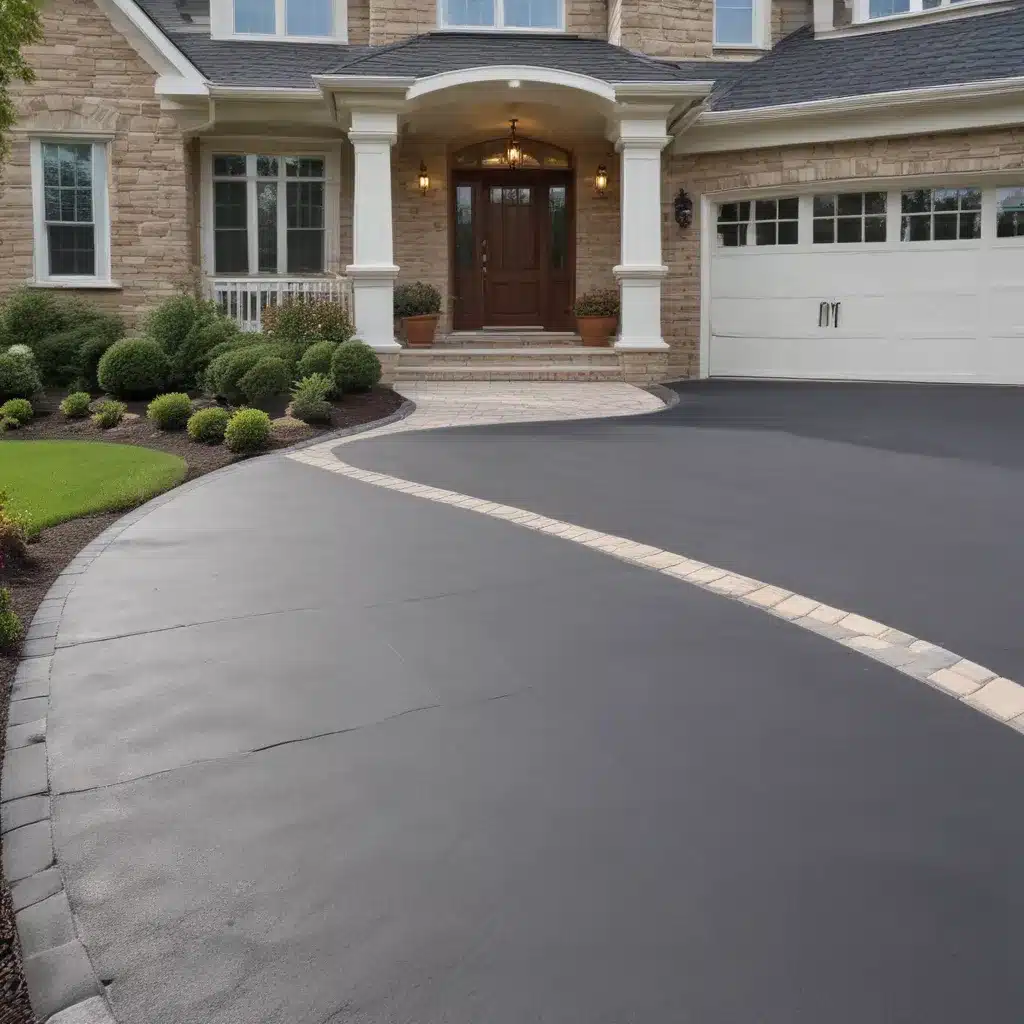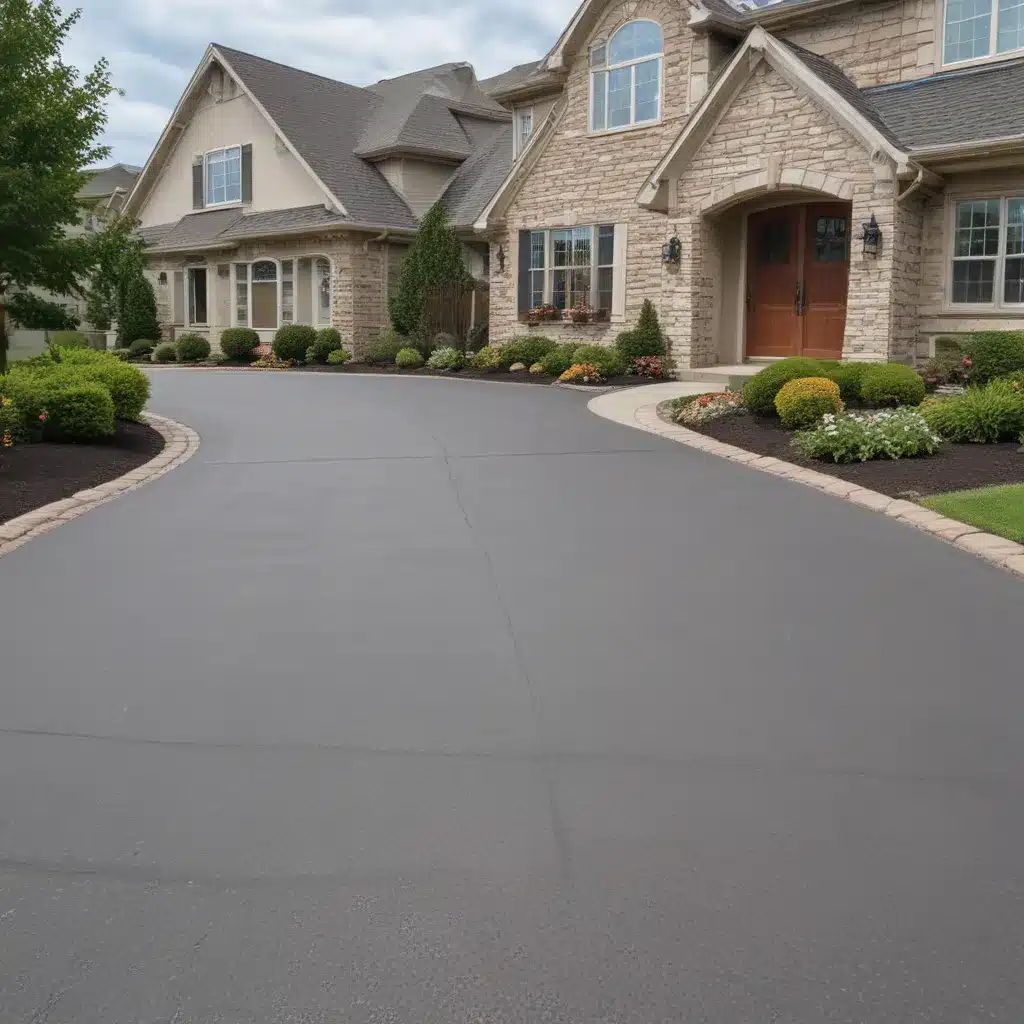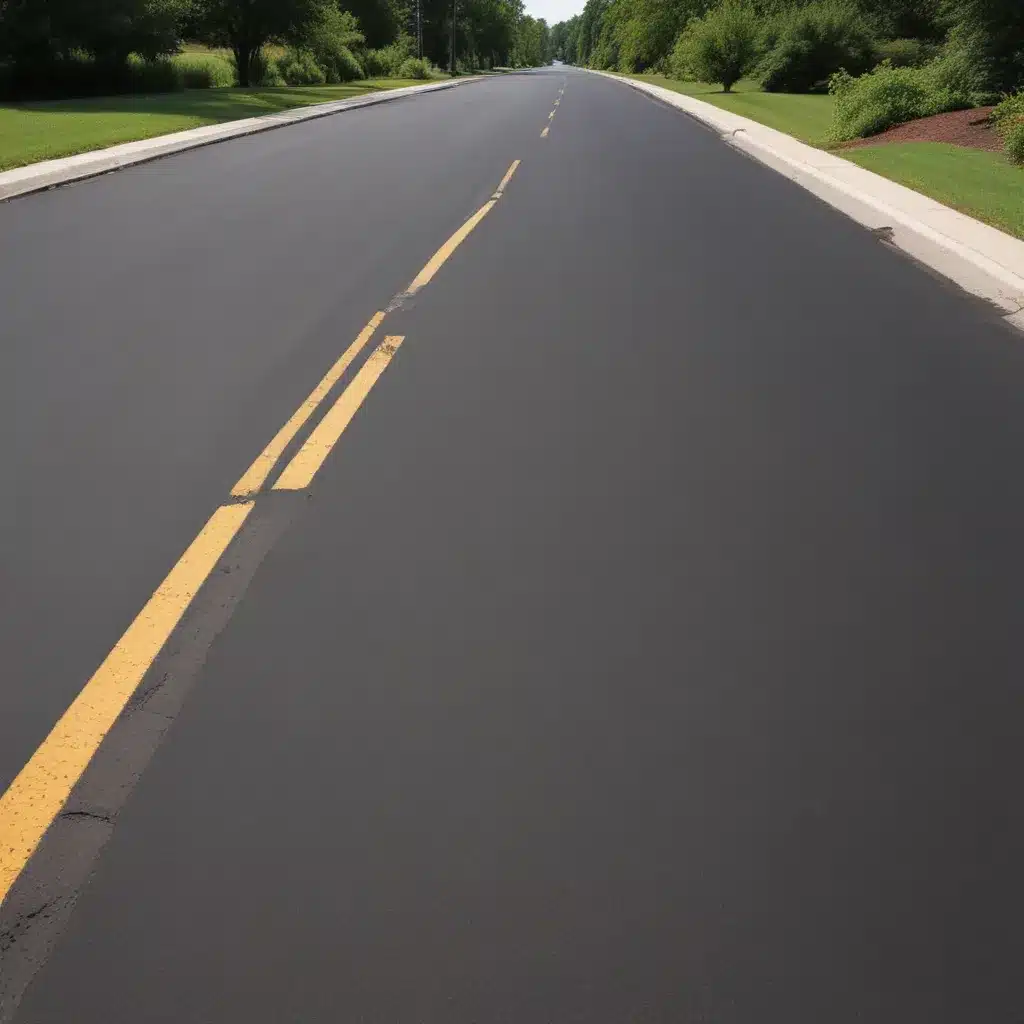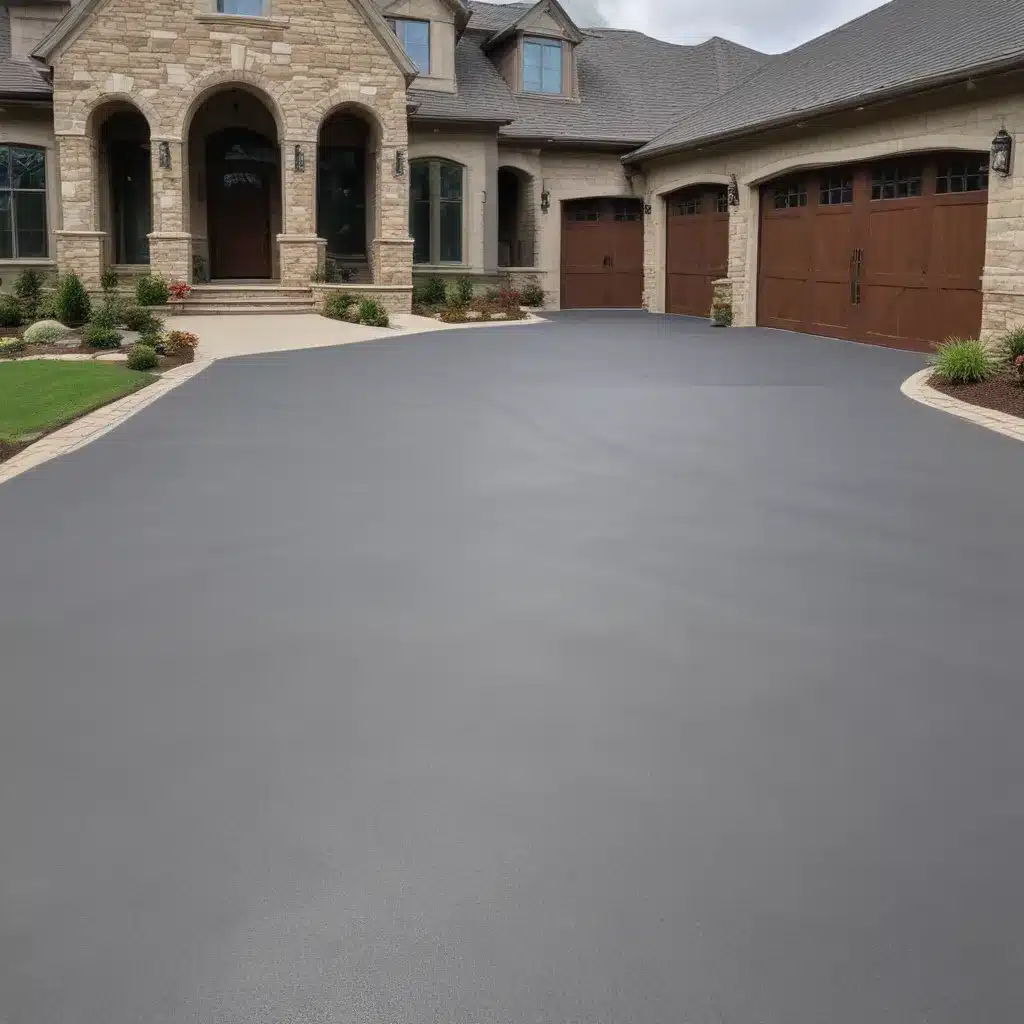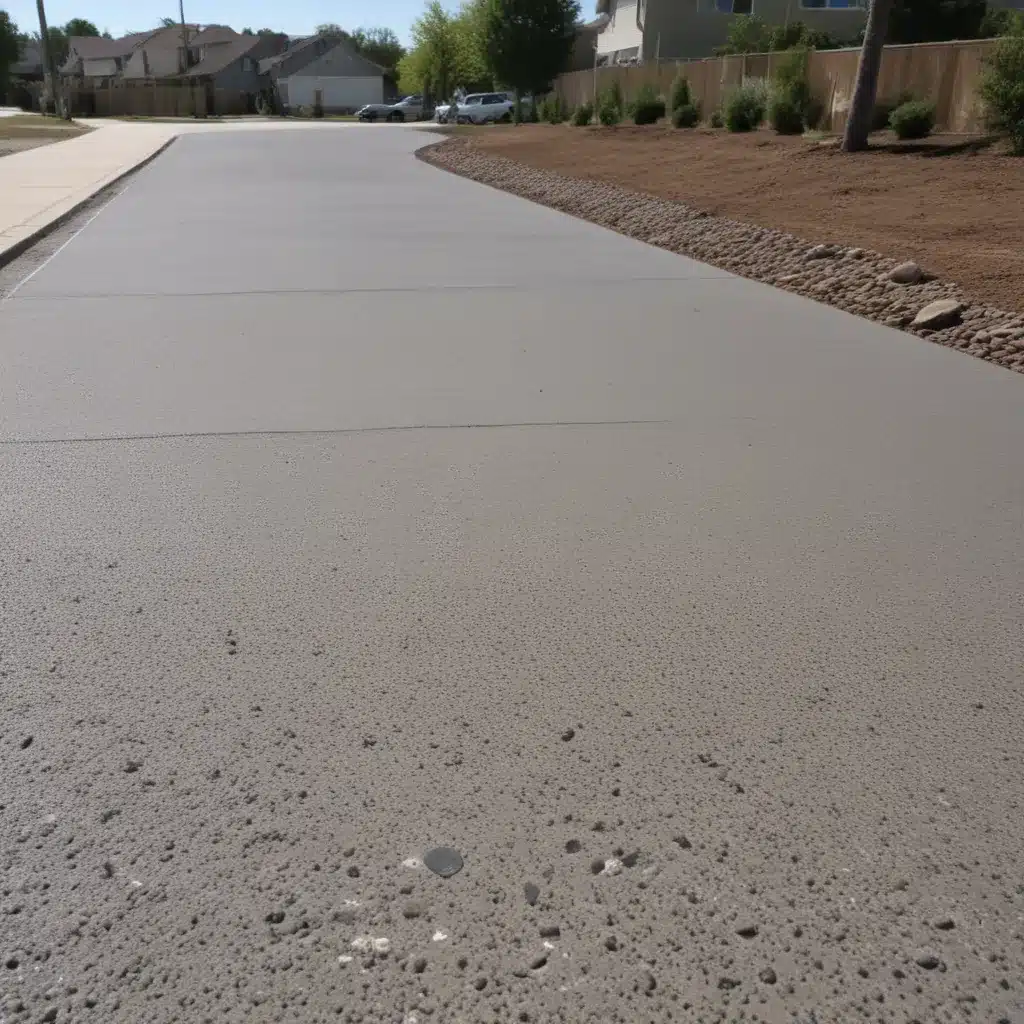The Driveway Dilemma: Navigating the Options
Picture this: You’re standing in front of your house, eyeing your driveway with a critical gaze. The once-pristine surface is now riddled with cracks, potholes, and an unsightly appearance that makes your heart sink. It’s time to take action, but the question is – what’s the best material for the job? Asphalt, concrete, or pavers? As a seasoned driveway aficionado (or at least someone who’s spent way too much time researching this topic), I’m here to guide you through the pros, cons, and nitty-gritty details of each option.
Asphalt: The Smooth Operator
Ah, asphalt – the classic choice for many homeowners. It’s smooth, versatile, and often the most budget-friendly option. But don’t let the initial cost fool you. Asphalt has its own set of unique considerations that you’ll want to weigh carefully.
One of the primary advantages of asphalt is its relatively low installation cost. Compared to concrete or pavers, the materials and labor required for an asphalt driveway are generally more affordable. However, this initial cost savings can be offset by the need for more frequent maintenance and potential repair work down the line.
Asphalt’s smooth surface is a delight for drivers, but it’s not impervious to the elements. The material can be susceptible to cracking, fading, and weathering over time, especially in areas with extreme temperature fluctuations or heavy use. This means that you’ll need to stay on top of sealcoating and resurfacing to keep your driveway looking its best.
Another factor to consider is the lifespan of an asphalt driveway. While asphalt can last for 15 to 20 years with proper care, it’s generally not as durable as concrete or pavers in the long run. So, if you’re planning to stay in your home for the foreseeable future, you may want to weigh the long-term costs and maintenance requirements against the initial savings.
But let’s not forget the aesthetic appeal of asphalt. With a range of color options and a sleek, modern look, an asphalt driveway can complement a variety of home styles, from traditional to contemporary. And let’s be honest, there’s something satisfying about the smooth, uninterrupted surface that just seems to invite you to take a leisurely stroll (or maybe a jog, if you’re feeling particularly energetic).
Concrete: The Sturdy Standby
If you’re looking for a driveway material that exudes durability and longevity, concrete might just be the answer. With its robust construction and resistance to weathering, concrete can offer a long-lasting solution that requires relatively low maintenance.
One of the key advantages of concrete is its exceptional lifespan. A well-installed concrete driveway can easily last 30 to 50 years, or even longer with proper care. This makes it a great investment for homeowners who plan to stay in their homes for the long haul. And let’s not forget the added resale value that a well-maintained concrete driveway can bring to your property.
But concrete’s strength and longevity come with a trade-off – the initial installation cost. Concrete is generally more expensive than asphalt, both in terms of materials and labor. However, when you factor in the reduced need for frequent repairs and the extended lifespan, the long-term savings can make it a worthwhile investment.
Another advantage of concrete is its versatility in terms of design. From classic gray to stamped patterns that mimic the look of natural stone, concrete can be customized to complement the aesthetic of your home. And let’s not forget the option of adding a decorative finish, which can truly elevate the visual appeal of your driveway.
Now, before you start dreaming of a pristine, unblemished concrete surface, it’s important to note that even the sturdiest of materials can succumb to the occasional crack or chip. Concrete is susceptible to minor cracks and damage over time, particularly in regions with significant temperature fluctuations or heavy traffic. But with proper maintenance and the occasional repair, these issues can be effectively managed.
Pavers: The Customizable Choice
If you’re looking to add a touch of personalization and visual flair to your driveway, pavers might just be the way to go. These interlocking concrete or stone units offer a unique and customizable option that can transform your outdoor space into a true showstopper.
One of the biggest advantages of pavers is the sheer range of design possibilities. From classic brick patterns to intricate mosaic-inspired layouts, the options are virtually endless. This makes pavers an excellent choice for homeowners who want to add a personal touch to their property and create a driveway that truly reflects their style and preferences.
But it’s not just about the aesthetics – pavers also offer practical benefits. Unlike a solid concrete or asphalt surface, pavers are installed individually, allowing for some flexibility in the event of damage or settling. If a single paver becomes cracked or uneven, it can be easily replaced without disrupting the entire driveway.
Another advantage of pavers is their durability and longevity. When properly installed and maintained, a paver driveway can last for decades, rivaling the lifespan of concrete. And let’s not forget the added traction and slip-resistance that pavers can provide, making them a great choice for homeowners in areas with snowy or icy conditions.
Now, the downside to pavers is the slightly higher initial cost compared to asphalt or concrete. Installing a paver driveway requires specialized labor and more intricate preparation of the underlying base. But for many homeowners, the long-term benefits and the ability to create a truly unique outdoor space make the investment well worth it.
The Driveway Decision: Weighing the Factors
As you can probably tell, there’s no one-size-fits-all solution when it comes to choosing the right driveway material. Each option has its own set of pros and cons, and the decision ultimately comes down to your personal preferences, budget, and long-term goals.
If you’re looking for a budget-friendly option with a smooth, sleek appearance, asphalt might be the way to go. But be prepared to stay on top of maintenance and sealing to keep it looking its best.
For those seeking a durable, low-maintenance solution with the potential for long-term savings, concrete could be the answer. Just be ready to handle the higher initial cost and the occasional minor repair.
And for the homeowners who want to unleash their inner designer and create a truly unique outdoor space, pavers might be the perfect choice. Just be prepared to invest a bit more upfront for the customization and specialized installation.
Ultimately, the choice is yours, and it’s important to weigh all the factors before making a decision. After all, your driveway is the first thing people see when they pull up to your home, so you’ll want to make sure it’s a reflection of your personal style and preferences.
And who knows, maybe you’ll even get to the point where you start referring to your driveway as your “pride and joy” – or at the very least, a source of endless conversation starters with the neighbors. After all, what’s a little driveway drama between friends?
Navigating the Driveway Installation Process
Now that you’ve weighed the pros and cons of each driveway material, it’s time to dive into the installation process. Whether you choose asphalt, concrete, or pavers, there are a few key steps you’ll need to consider to ensure a smooth (pun intended) and successful project.
First and foremost, it’s crucial to find a reputable and experienced contractor who can guide you through the process. A good contractor will not only have the technical expertise to properly install your driveway but also the customer service skills to keep you informed and involved every step of the way.
Once you’ve found your contractor, the next step is to prepare the site. This typically involves excavating the existing surface, grading the area to ensure proper drainage, and laying a solid base. Depending on the material, this base might consist of gravel, crushed stone, or a concrete slab.
For asphalt driveways, the contractor will then apply a layer of hot mix asphalt, compacting it to create a smooth, durable surface. Concrete driveways, on the other hand, require the pouring and curing of the concrete, with the option to add decorative finishes or patterns.
Paver driveways are a bit more intricate, as each individual paver must be laid in a specific pattern and secured with a sand or gravel base. This process requires a keen eye for detail and the right tools to ensure a flawless, long-lasting installation.
Regardless of the material you choose, it’s important to be prepared for the disruption that the installation process can cause. Expect some noise, dust, and temporary access limitations as the work progresses. But with a reliable contractor and a little patience, you’ll be well on your way to a brand-new, beautiful driveway in no time.
And let’s not forget the all-important post-installation care. Each driveway material has its own maintenance requirements, from sealcoating and resurfacing for asphalt to regular cleaning and the occasional repair for concrete and pavers. But with a little TLC, your driveway can continue to look its best for years to come.
The Driveway Domino Effect: Enhancing Your Outdoor Space
As you navigate the world of driveway materials, it’s important to remember that your choice can have a ripple effect on the overall aesthetic of your outdoor space. After all, the driveway is often the first thing people see when they approach your home, so it’s crucial to ensure that it seamlessly integrates with the rest of your property.
Take, for example, the case of the Smith family. They had been debating between asphalt and concrete for their driveway, but once they started to consider the bigger picture, they realized that pavers might be the way to go. The reason? Their beautifully landscaped front yard, complete with a charming walkway and lush garden beds, just begged for a complementary paver driveway.
By choosing pavers, the Smiths were able to create a cohesive outdoor aesthetic that tied their entire property together. The rich, earthy tones of the pavers echoed the natural elements of their landscaping, while the intricate pattern added a touch of visual interest that made their home stand out in the neighborhood.
But the driveway domino effect doesn’t stop there. Once the Smiths had their stunning new paver driveway installed, they couldn’t help but turn their attention to the rest of their outdoor space. They decided to spruce up their front porch with a fresh coat of paint, and even invested in a few stylish planters to flank the entrance.
The end result? A true outdoor oasis that not only wowed their guests but also increased the overall curb appeal and value of their home. And it all started with that seemingly simple decision to go with pavers for their driveway.
Of course, the driveway-to-outdoor-space connection isn’t limited to pavers. Whether you choose asphalt, concrete, or another material, the key is to think about how your driveway will complement and enhance the rest of your property. Maybe a sleek, modern concrete driveway would be the perfect contrast to a lush, traditional landscape. Or perhaps a warm, earthy asphalt surface would tie in beautifully with a rustic, farmhouse-inspired aesthetic.
The possibilities are endless, and the choice is ultimately up to you. But one thing is for sure – your driveway is the foundation (pun intended) for your entire outdoor space, so it’s worth taking the time to get it right.
The Driveway Diaries: Real-Life Lessons Learned
As someone who has been immersed in the world of driveways for far too long, I can’t help but share a few real-life lessons that have stuck with me over the years. After all, what’s the point of having all this driveway expertise if I can’t entertain you with a few juicy stories?
Take, for instance, the case of the Smith family (yes, them again). After their impeccable paver driveway installation, they were the envy of the entire neighborhood. That is, until a particularly harsh winter hit, and their once-pristine pavers started to shift and settle. Turns out, they had skimped on the crucial base preparation, and the freeze-thaw cycle had taken its toll.
The Smiths quickly learned that when it comes to driveway installation, cutting corners is never a good idea. They ended up having to fork over a pretty penny to have their driveway professionally repaired, and it served as a valuable lesson that sometimes, it pays to invest a little more upfront to ensure long-term durability.
Then there’s the tale of the Jones family, who had their hearts set on a sleek, modern concrete driveway. They hired a contractor who promised to have the job done in a jiffy, only to end up with a surface that looked more like a wavy ocean than a flat driveway. Turns out, the contractor had failed to properly grade the site, leading to uneven concrete that was both an eyesore and a safety hazard.
The moral of the Jones family’s story? Always, always, always do your due diligence when it comes to choosing a contractor. Don’t just go with the cheapest option or the first person who knocks on your door. Take the time to research, check references, and make sure you’re working with a reputable, experienced professional.
And let’s not forget the cautionary tale of the Anderson family, who decided to tackle their driveway project as a DIY endeavor. They spent countless hours watching tutorial videos, agonizing over color choices, and (quite literally) breaking a sweat as they laid each paver by hand. But in the end, their efforts resulted in a driveway that was more akin to a funhouse than a functional entryway.
The takeaway here? Sometimes, it’s best to leave the heavy lifting to the professionals. While a DIY project can be tempting, driveway installation is a complex undertaking that requires specialized knowledge, tools, and equipment. Unless you’re a seasoned contractor yourself, it’s often worth the investment to hire someone who knows what they’re doing.
Of course, these are just a few of the many driveway dramas I’ve witnessed over the years. But the common thread among them is the importance of planning, research, and attention to detail. Whether you’re choosing between asphalt, concrete, or pavers, or simply trying to find the right contractor for the job, taking the time to do it right can save you a world of headache (and a hefty repair bill) down the line.
Conclusion: The Driveway of Your Dreams Awaits
As you’ve probably gathered by now, the world of driveways is a vast and ever-evolving landscape. From the smooth and sleek appeal of asphalt to the timeless durability of concrete, and the endless design possibilities of pavers, the options can seem downright overwhelming.
But fear not, my fellow driveway enthusiasts! With a little bit of research, a dash of creativity, and the guidance of a trusted contractor, you can transform your outdoor space into a true work of art – one that not only looks stunning but also stands the test of time.
Whether you’re drawn to the budget-friendly appeal of asphalt, the long-term savings of concrete, or the customizable charm of pavers, the key is to weigh all the factors and make a decision that aligns with your personal preferences, your home’s aesthetic, and your long-term goals.
And remember, your driveway is so much more than just a utilitarian pathway to your front door. It’s a reflection of your style, a canvas for your creative expression, and a crucial component of your home’s overall curb appeal. So, why not make it a true showstopper that leaves your neighbors green with envy?
So, what are you waiting for? Grab your measuring tape, start exploring your options, and get ready to embark on the driveway journey of a lifetime. Who knows, you might just end up with a surface so smooth and sleek that you’ll be tempted to don your roller skates and put on a little driveway dance show for the whole neighborhood.
Just don’t forget to wave to the neighbors as you glide by – after all, you’ve got the driveway of your dreams, and you’re not afraid to flaunt it.

